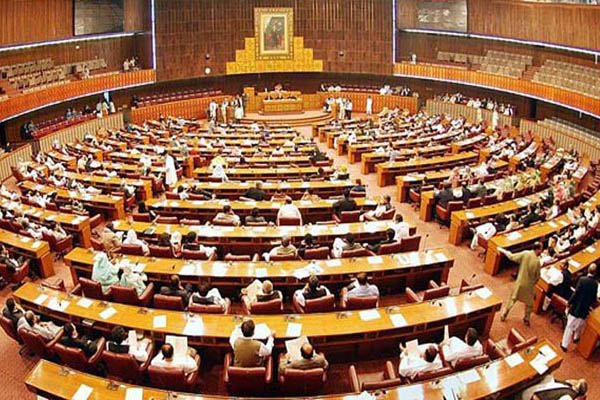
File photo
Pakistan’s National Assembly on Thursday passed the Elections (Amendment) Bill, 2022, aimed at removing a requirement to utilize electronic voting machines (EVMs) in general elections and withdrawing an option for overseas Pakistanis to vote from their place of residence.
Tabled by Parliamentary Affairs Minister Murtaza Javed Abbasi, the bill was passed with a majority vote, with only members of the Grand Democratic Alliance opposing it. The Lower House also passed a motion to allow the bill to be sent directly to the Senate for its approval, bypassing the relevant standing committee.
During debate on the legislation, Law Minister Azam Nazeer Tarar noted that the previous Pakistan Tehreek-e-Insaf (PTI)-led government had made multiple amendments to the Elections Act, 2017 through the Elections (Second Amendment) Bill, 2021. That bill was “bulldozed” through the Lower House along with 32 other legislations last year despite strong protest from the then-opposition.
Tarar said the new bill’s aim was to restore the Elections Act, 2017 to its framework from prior to the PTI’s amendments, thereby ensuring free, fair, and transparent elections. In this regard, the bill has made changes to Sections 94 and 103 of the Act.
The amendment to Section 94 of the Election Act, 2017, recommends the Election Commission of Pakistan (ECP) conduct pilot projects for internet voting by overseas Pakistanis in by-elections to determine the facility’s technical efficacy, secrecy, security, and financial feasibility. Once these results had been shared with the government, it says, it shall share it with both houses of Parliament within 15 days of the commencement of the next session of either house. For the amendment to Section 103 of the Election Act, 2017, the ECP has similarly been tasked with conducting pilot projects for the use of EVMs and biometric verification system in by-elections.
During his speech, the law minister noted that the ECP had also raised objections to the use of EVMs and stressed that the government was not against the use of technology, but wanted to ensure it was not misused to favor any single political party. He also rubbished claims that this would “deprive” overseas Pakistanis of their right to vote. “Overseas Pakistanis are a precious asset of the country and the government does not believe in snatching their right to vote,” he said.
The ECP also shared details of expenses for the next general elections during the assembly session, saying they would cost approximately Rs. 47.41 billion, of which around Rs. 15 billion were required for security. According to the electoral body, the cost of conducting electronic voting was Rs. 5.6 billion, while ballot papers would cost Rs. 4.83 billion. Another Rs. 1.79 billion would be utilized to train polling staff, it said.
In a speech after the passage of the Elections (Amendment) Bill, 2022, Prime Minister Shehbaz Sharif thanked parliamentarians for voting in its favor, claiming it would ensure the conduct of free and fair elections. He also discussed the country’s economic crisis, saying “major challenges” could only be overcome through hard work and dedication.
NAB amendments
The parliamentary affairs minister also tabled a bill for amendments to the National Accountability Ordinance, 1999, the National Accountability (Second Amendment) Bill, 2021.
Addressing the proposed amendments to the controversial accountability law, minister Tarar said it had been used to victimize political opponents, as also stated by the judiciary in various cases. Slamming former prime minister Imran Khan for wanting to legislate through presidential ordinances, he said that the coalition government did not want anyone else to suffer from the excesses of the law as they had done in the past.
“This law gave NAB powers of 90-day remand, which is non-bailable. Such remand is for terrorists and criminals who can be brainwashed. We are trying to make better amendments and improve the system,” he added.
The House later approved the bill.
